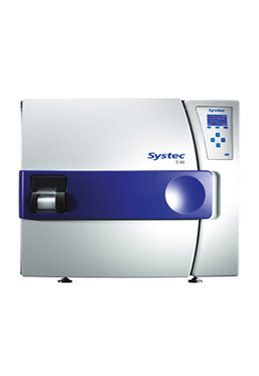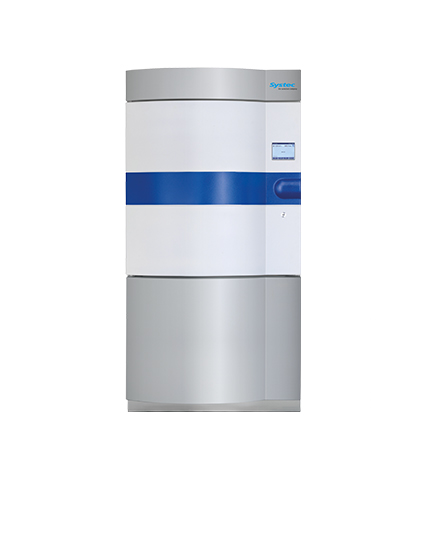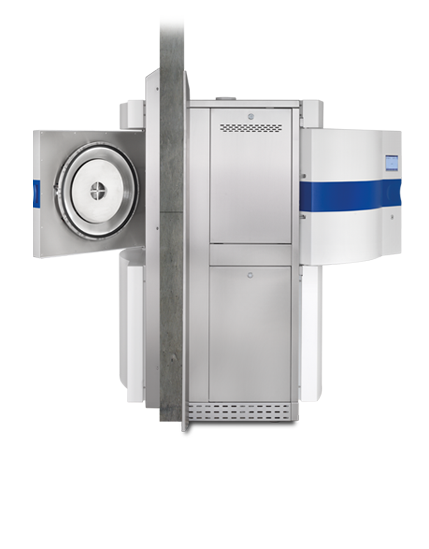Autoclaves for the laboratory
Laboratory Autoclave Sterilizers
The autoclaves / sterilizers from Systec are equipped with advanced sterilization programs and features specifically tailored to meet the sterilization requirements of microbiology, biopharma, food, chemical, and various other life science laboratories. Systec’s state-of-the-art laboratory autoclaves consistently uphold the highest benchmarks for quality, safety, and performance. These advanced autoclaves are relied upon by life science laboratories and research institutions across the globe, providing users with absolute confidence in Systec’s solutions.
The laboratory autoclaves (laboratory sterilizers) from Systec specially developed for laboratory sterilization applications, makes processes safer, easier, accurate, reproducible and validatable. The autoclaves can be used in all laboratory applications, even in demanding sterilization processes: the sterilization of liquids (such as nutrient and culture media), solids (such as instruments, pipettes, glassware), waste (destructive sterilization of liquid waste in bottles, or solid waste in destruction bags) and biological hazards in safety laboratories.
The autoclaves are successfully used in research as laboratory autoclaves as well as in production as industrial autoclaves (e.g. as production autoclave in the pharmaceutical industry or the food industry) for more than 30 years.
The right autoclave for your needs? There are many important criteria for the selection of a suitable autoclave. Contact us and we will help you to find the autoclave that is right for you, including options and accessories!
FIND THE RIGHT AUTOCLAVE WITH SYSTEC!
Autoclaves from Systec: You can choose from more than 70 different types of autoclaves, with chamber volumes ranging from 23 to 1580 liters, universal installation options as a vertical top-loading or horizontal bench-top autoclave and numerous other features. We are happy to work with you to configure the optimal autoclave in terms of size and process technology, so that you can perform your sterilization process safely, precisely, reproducibly and in a validatable way. Put your trust in more than 30 years of expertise in the fields of steam sterilization and process development, even of the most complex autoclave technologies.
We support a wide range of national and international laboratories, food companies, educational institutes, research institutions and pharmaceutical suppliers with our autoclaves around the world.

Vertical floor-standing autoclaves (top-loading) from 40 to 150 liters chamber volume
more
Horizontal bench-top autoclaves (front loading) from 23 to 200 liters chamber volume
more
Horizontal high capacity autoclaves (front-loading) from 65 zo 1580 liters chamber volume
moreOPTIMIZATION OF STERILIZATION PROCESSES
All autoclaves are built modular and can be equipped with options and accessories for optimization of sterilization processes. Thus, only the options are fitted to the autoclave that are necessary for optimization of the relevant sterilization processes.
(e.g. culture media, nutrient media)
(e.g. instruments, pipettes, glassware)
(e.g. destruction of liquid waste in bottles or solid waste in waste bags)

in biological safety laboratories
SYSTEC AUTOCLAVES: HEAT-UP, STERILIZATION, COOLING OR DRYING?
The autoclaves can be configured that a validation of the sterilization process is possible, to proof a reproducible sterilization in safety laboratories, in cleanrooms and in production facilities. Gladly be support you with qualification and validation of your sterilization processes.
- Design Qualification (DQ)
- Installation Qualification (IQ)
- Operational Qualification (OQ)
- Process Qualification (PQ)
All steps of the qualification process can be supported by our competent personnel and will be documented according to GMP requirements.
Along with the mentioned application areas, the autoclaves can also be used for further applications such as material test (stress tests) or for simulation of industrial sterilization processes in a smaller scale.
Contact us that we can configure the optimal autoclave with regards to size and process technology with you. Trust in more than 30 years of expertise in the area of steam sterilization and process development even of most complex autoclave technologies.
AUTOCLAVE – DEFINITION AND APPLICATION AREAS
Autoclave (Greek/Latin: self-sealing): A gas-tight, sealable pressure vessel, used for the thermal treatment of substances in the overpressure range. Autoclaves are used for sterilizing, curing building materials, for vulcanising tires and belts and for pressing fiber composites. As a result, they are used in medical and food technology, biology, the glass and aviation industries, as well as in brickworks and vulcanising plants.
Autoclaves are based on the functional principle of “Papin’s pot”, developed by the French physicist Denis Papin in 1674/79 and patented in 1681. Autoclaves are available for small volume applications but there are also large-scale units for large production quantities. The substances are thermally treated in batches (batch operation) because of the typical closure with respect to the surrounding atmosphere. The pressure vessels are also normally equipped with quick-release closures that enable the pressure vessel to be opened and closed much more quickly than with flanged pressure vessel openings. Source: Wikipedia
The right autoclave for your needs?
Benefit from our experience with our autoclaves all over the world! From small autoclaves from 40 liters to large autoclaves up to 1580 liters, we are offering a large range of laboratory autoclaves! Our sales and service team will assist you to achieve your sterilization and processing needs! Systec, your partner for autoclaves and laboratory sterilizers – made in Germany!
Laboratory autoclaves
Maintaining infection control and a sterile work environment is a top priority for a modern laboratory or research facility. This makes autoclaves indispensable. They ensure that unwanted and harmful microorganisms are destroyed. Usually, autoclaves with a steam sterilization function are used in laboratories. These employ the intense heat of the steam to build up pressure within the device and so kill bacterial spores by denaturing and flocculating their cell proteins through hydrolysis.
Our high quality and long lasting autoclaves are ideal for a wide range of applications in the modern laboratory!
Autoclaves: options and accessories
As numerous as the fields of application for autoclaves are, so varied are the available autoclaves and their options. Although autoclaves are built with the same basic features, they do vary in shape, size and functionality, while adhering to the same manufacturing rules and standards of performance and core safety. Major laboratories and production facilities certainly place different demands on autoclaves than highly specialised research facilities or small labs with all-round applications do. Consequently, the decision to purchase must be preceded by a detailed needs analysis that takes current and future demands on the autoclave into account. Besides spatial and ergonomic aspects, such as simple, careful operation and economic efficiency, as well as safe, precise and above all reproducible and validatable sterilization, some other important factors need to be considered.
How to select the right autoclave?
Amongst other things, important criteria for choosing a suitable autoclave include: What needs to be sterilized? Which external dimensions should the autoclave have? How large a volume should the vessel have? Here, a distinction has to be made between horizontal and vertical autoclaves or pass-through autoclaves. Which other features and options should the autoclave have? All the criteria mentioned (and others) have a great influence on the operation of the autoclaves and on the workflow in modern laboratories.
Autoclaves and Technology
Our serial autoclaves are equipped for a sterilization temperature up to 140°C and a steam pressure up to 4 bar. These devices are the first laboratory autoclaves of their type suitable for higher temperatures at higher pressures. The standard pressure vessel is designed for up to 5 bar /150°C. With the optional temperature and pressure range extension, the control, monitoring and safety components are also adapted to the higher pressure and temperature range. This option can also be retrofitted later. The sterilization chamber is made of corrosion-resistant stainless steel 316L (1.4404), electropolished and easy to clean. The device features a type-tested safety valve for pressure relief when limit values are exceeded. The stable supporting frame construction and the housing panels are also made of stainless steel. Thanks to the highly effective and high-quality insulation made of Hanno-Tect, there is no risk of particle separation, which is why our autoclaves are particularly suitable for the use under clean room conditions. Our doube-door pass-through autoclaves are ideal for the use in Bio-Safety Level (BSL) facilities by ensuring a hermetically sealed barrier between sterile and non-sterile areas.
Systec provides autoclaves for safe, accurate, reproducible and validatable sterilization of liquids, solids and waste to satisfy the needs of biopharma, food, chemical, microbiology and life science laboratories.
Find our article about “Sterilization of liquids, solids, waste in disposal bags and hazardous biological substances” with our autoclaves here.
Save COVID-19 Research with Systec Autoclaves
Our laboratory autoclaves are ideal for sterilization of contaminated waste, instruments, culture media or laboratory equipment to prevent the accidental spread of the coronavirus. We are offering the ideal autoclaves for safe and validatable sterilization with accurate documentation.






